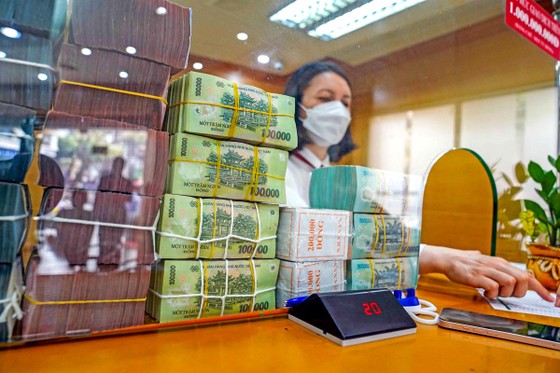Economy headwinds challenges banks to promote lending
Despite decreasing interest rates and abundant credit growth quota, experts said it is difficult for commercial banks to promote lending in the context of difficult economic conditions and reduced consumption in the market.
 |
|
A bank teller counts cash at a transaction office in Hà Nội. Despite the SBV’s strong loosening of monetary policy, credit growth in the economy remains slow, with an increase of only 4.73 per cent as of June 30 this year compared to the end of 2022, the lowest level for the past ten years. Photo dttc.sggp.org.vn |
Unlike previous years, the State Bank of Vietnam (SBV) this year allocated the credit growth quota of around 14 per cent in the whole year of 2023 for commercial banks right at the beginning of July 2023 with an aim to boost lending. Previously, the central bank only announced the quota in the last quarter of a year.
In the first half of 2023, the SBV also reduced its policy interest rate four times to promote loans. Accordingly, the refinancing and rediscount interest rates decreased by a total of 1.5 per cent while the maximum interest rate applicable to deposits with a term from one month to less than six months was reduced by 1.25 percentage points per year.
Besides directing commercial banks to review and simplify lending procedures, the SBV also issued a circular to restructure the repayment term and keep the debt group unchanged, which aimed to ease existing borrowers to continue to turn over capital and access new loans.
Despite the SBV’s move, credit growth of the economy is still too slow, with an increase of only 4.73 per cent as of June 30 this year compared to the end of 2022, the lowest level for the past ten years.
According to experts, the SBV has loosened its monetary policy this year quite strongly to fulfil the requirement to push capital for economic recovery as directed by the Government, but it is difficult for the economy to absorb this capital.
In an economic report released in July 2023, experts of the Vietnam Economic Data Joint Stock Company (Vietdata), said the capital absorption of the economy is quite weak. The main reason is due to the high number of enterprises that had to temporarily suspend business and dissolve in the first half of 2023, and the gloomy economic outlook that caused many firms not to dare to invest in expanding business and production.
Firms that really needed capital found it difficult to meet banks’ loan application standards while demand for personal loans to buy cars and real estate also dropped sharply.
Meanwhile, Vietdata’s experts said it will still be difficult for Việt Nam to have a breakthrough in economic growth in the second half of this year. Accordingly, inflation and exchange rate pressures are still present but not too ominous, and Việt Nam's economy is expected to inch up thanks to the Government's supportive policies and solutions to remove difficulties for the real estate and bond markets.
“Though interest rates are gradually decreasing, exports may increase slightly compared to the first half of this year and international tourists to Việt Nam are expected to increase in volume.
It will still be difficult for Việt Nam to have a breakthrough in economic growth in the second half of this year, as the country's economy is still heavily dependent on export,” the report said, explaining that the total import demand data of the EU, China, US, Japan and Korea markets have not shown any significant changes.
In addition, the recovery of the Chinese market was not as expected. China's economy is losing its growth momentum, so the ability to export to this market is also unlikely to break through in the second half of this year.
Under the context of the strong loosening of monetary policy, experts also warned State management agencies to have solutions to control the lending mechanism to boost up loans to productive firms and avoid the capital flow into risky areas or firms that serve as “backyards” of banks, which will further exhaust the economy.








